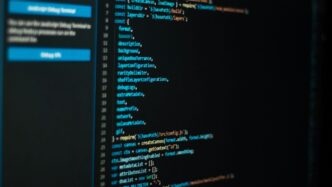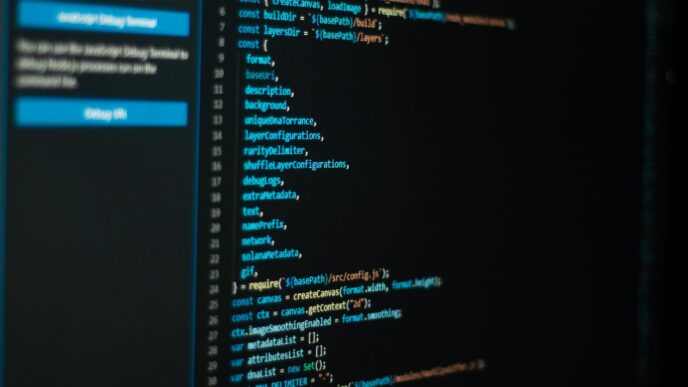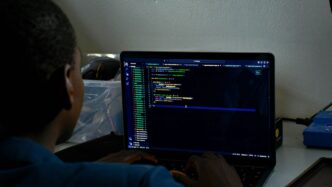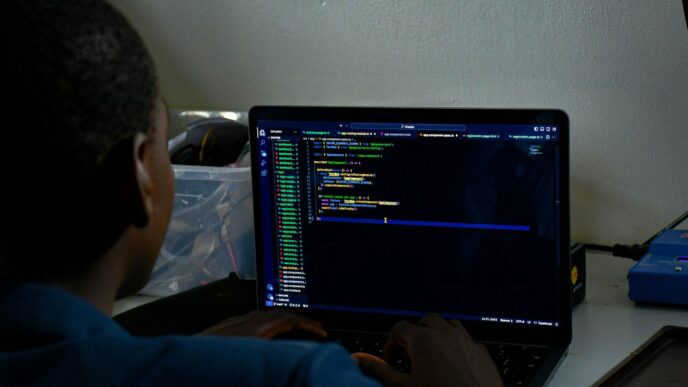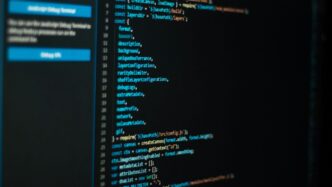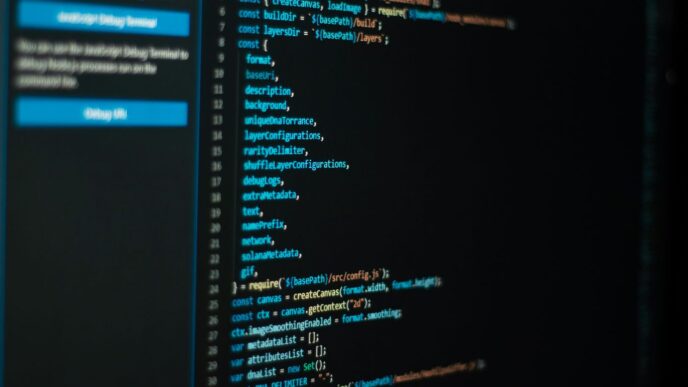Thinking about learning to code but don’t want to spend a fortune? You’re in luck. In 2025, there are tons of ways to learn Python for free. This guide will walk you through how to get started, where to find good resources, and how to keep learning without breaking the bank. Python is a great language to start with because it’s used in so many different areas, from web development to data science, and it’s known for being pretty easy to pick up.
Key Takeaways
- You can learn Python for free using a variety of online platforms, including interactive courses, video tutorials, and official documentation.
- AI tools like ChatGPT and Code Llama can offer instant help, debugging assistance, and code generation to support your learning.
- Structured learning paths like the ‘Zero to Hero’ approach or the ‘100 Days of Code’ challenge can provide direction and motivation.
- Building a portfolio by working on projects is a practical way to solidify your skills and demonstrate your abilities.
- Engaging with the Python community and practicing regularly are important for continuous learning and improvement.
Getting Started: Your Free Python Learning Journey
So, you’re thinking about learning Python in 2025, and you want to do it without spending a dime? That’s totally doable. Python is a fantastic language to start with, especially if you’re new to coding. Its syntax is pretty straightforward, almost like reading English, which makes a big difference when you’re just starting out. You don’t need a fancy degree or a background in computer science to pick it up. The most important thing is to just start and keep going.
Why Choose Free Resources to Learn Python
There are tons of reasons to go the free route. For starters, it lets you test the waters without any financial commitment. Maybe you’re just curious, or perhaps you’re looking to switch careers. Free resources allow you to explore Python and see if it’s the right fit for you. Plus, the Python community is huge and super helpful, meaning you’re never really alone when you hit a snag. You can find everything from quick tips to in-depth guides online. It’s a great way to gain new skills for automating tasks, analyzing data, or even building simple applications.
Essential Python Concepts for Beginners
When you’re starting, focus on a few core ideas. These are the building blocks for pretty much everything you’ll do in Python:
- Data Types: Understanding numbers, text (strings), lists, and dictionaries is key. Think of these as the different kinds of information your program will work with.
- Control Flow: This is how you tell your program what to do and when.
if-elsestatements and loops (for,while) help your code make decisions and repeat actions. - Functions: These are like mini-programs within your program. They let you write a block of code once and use it multiple times, which keeps things organized.
- Modules and Libraries: Python comes with a lot of pre-written code (libraries) that you can use to do specific tasks, like working with data or building web pages. You’ll learn how to import and use these.
Getting a handle on these basics will set you up nicely. You can find a beginner-friendly Python tutorial that covers these topics step-by-step.
Setting Up Your Development Environment
To start coding, you’ll need a couple of things. First, you need to install Python itself. You can download the latest version from the official Python website (python.org). After that, you’ll need a place to write your code. For beginners, Thonny is a great choice because it’s simple and easy to use. If you want something a bit more powerful as you progress, editors like VS Code or PyCharm are popular options. Don’t get too hung up on having the ‘perfect’ setup initially; the main goal is to get your first lines of code running.
Top Platforms to Learn Python Free Online

So, you’re ready to dive into Python without spending a dime? That’s totally doable. There are tons of great places online where you can pick up Python skills for free. Think of it like having a whole library of coding knowledge at your fingertips, ready whenever you are.
Interactive Courses and Coding Challenges
For many people, the best way to learn is by doing. Interactive courses are fantastic for this. You get to write code right in your browser, and often, you get immediate feedback. It’s like having a patient tutor who’s always there to check your work.
- Mimo: This platform is great if you like learning by typing code from the get-go. It breaks things down into small, manageable lessons. You’ll go from basic syntax all the way to functions and classes, with plenty of hands-on practice.
- Khan Academy: They offer a solid Python course that uses video lessons and text, but the real magic is in the assignments. You’ll actually build things like recommendation engines and simple games, which really helps solidify what you’re learning.
- JetBrains Academy: If you want to get a feel for what it’s like to code in a professional setup, this is a good pick. You learn Python right inside an integrated development environment (IDE), which has helpful features like code completion. It’s a nice way to get used to tools that developers actually use.
Comprehensive Video Tutorials
Sometimes, seeing someone else code and explain things makes all the difference. Video tutorials are perfect for visual learners or when you just need a different perspective on a tricky concept.
- Dave Gray’s Python Tutorial: This is a pretty extensive video course that covers Python from the ground up. It’s well-organized, like a textbook, and even includes building a web application project at the end. It’s a good way to see how all the pieces fit together.
- Mosh Hamedani’s Python for Beginners: This one is super popular for a reason. It’s a quick, one-hour crash course that manages to pack in all the core Python basics. Mosh codes along with you, explaining why he’s doing what he’s doing, which is super helpful.
Official Documentation and Guides
When you want the most accurate and detailed information, you can’t beat the official sources. These are often text-heavy, but they are the definitive word on how Python works.
- The Official Python Tutorial (Python.org): This is the source. Written by the people who make Python, it covers everything from the absolute basics to more advanced topics. It’s great for self-starters who like to read and experiment with code examples directly.
- Full Stack Python: If you’ve got some Python basics down and want to build web applications, this free online book is a goldmine. It covers the whole process, from coding to databases and deployment, in a clear, topic-by-topic way.
Leveraging AI Tools for Free Python Learning
So, you’ve got the basics down, maybe you’ve gone through a few tutorials, and now you’re hitting a wall. Or maybe you just want to speed things up a bit. That’s where AI tools come in. They’re not going to replace learning, but they can seriously help you out. Think of them as your super-smart coding buddies, available 24/7.
AI Chatbots for Instant Help and Debugging
These are probably the most common AI tools you’ll run into. Tools like ChatGPT are fantastic for getting quick answers. Stuck on what a specific Python function does? Just ask. Got an error message that makes no sense? Paste it in, along with your code, and see if the AI can spot the problem. It’s like having a tutor who never gets tired.
- Explain code snippets: If you find a piece of Python code online and can’t figure out what it’s doing, ask an AI chatbot to break it down for you. You can even ask it to explain it in simpler terms if the first explanation is too technical.
- Debug errors: When your code breaks, copy and paste the error message and the relevant code into the chatbot. It can often point out syntax mistakes, logical flaws, or suggest ways to handle exceptions.
- Generate practice problems: Need more practice with loops or dictionaries? Ask the AI to create custom coding challenges tailored to the concepts you’re struggling with.
It’s important to remember that AI isn’t perfect. Always double-check the code and explanations it gives you. Sometimes it gets things wrong, especially with more complex or niche topics.
Open-Source AI Coding Assistants
If you’re a bit more technically inclined or concerned about privacy, open-source AI assistants are a great option. Tools like Code Llama, developed by Meta, can be downloaded and run on your own computer. This means you can use them offline and have more control over your data.
- Code Generation: Describe what you want your Python code to do in plain English, and the AI can try to write it for you. This is great for getting a starting point or seeing how a particular task can be coded.
- Code Explanation: Just like chatbots, these assistants can explain existing code, helping you understand how different parts of a program work together.
- Local Execution: Running these tools locally means you don’t need a constant internet connection, and your code stays on your machine.
These tools are powerful, but they might require a bit more setup than just visiting a website. However, the benefit of having a capable AI assistant running on your own hardware is pretty significant for serious learners.
Enhancing Practice with AI-Powered Tools
Beyond just asking questions, AI can actively help you practice and improve. Some platforms integrate AI directly into their learning environment. For instance, you might find AI assistants that review your code as you write it, offering suggestions for better style or efficiency right then and there.
- Real-time Feedback: As you type Python code, an AI might highlight potential issues or suggest more Pythonic ways to write something.
- Learning Paths: Some AI tools can help create personalized study plans based on your goals and current skill level.
- Project Assistance: Tools integrated into development environments can help you work on actual projects, explaining parts of the codebase or suggesting ways to implement new features.
Using these AI tools can make your free Python learning journey much more efficient and interactive. Just remember to use them as a supplement to your learning, not a replacement for understanding the core concepts yourself.
Structured Learning Paths for Python Mastery
So, you’ve got the basics down, maybe you’ve tinkered with a few tutorials, and now you’re wondering, ‘What’s next?’ Learning Python isn’t just about memorizing syntax; it’s about building things and solving problems. That’s where structured learning paths come in. They give you a roadmap, helping you move from just knowing Python to actually using it effectively. Having a clear plan makes a huge difference in staying motivated and seeing real progress.
The ‘Zero to Hero’ Approach
This path is all about taking you from absolutely no coding knowledge to being proficient. Think of it as building a house from the ground up. You start with the foundation – understanding variables, data types, and basic logic. Then you move on to building the walls with functions and control flow, and finally, you add the roof with more advanced concepts like object-oriented programming or working with libraries. Many online courses, like those found on Mynsha, are designed with this ‘zero to hero’ idea in mind, providing step-by-step guidance. It’s a thorough way to learn, making sure you don’t miss any important building blocks.
The ‘100 Days of Code’ Challenge
This is a popular way to build a consistent coding habit. The idea is simple: code for at least an hour every day for 100 days. It’s not about learning everything in 100 days, but about the discipline of showing up and coding regularly. You can follow a pre-set curriculum or create your own. The key is consistency. You might start with basic syntax and gradually move to more complex topics, working on small projects each day. This challenge really helps solidify what you learn and builds momentum. It’s a great way to see how fast you can learn Python with daily practice.
Building a Portfolio with Projects
Honestly, the best way to prove you know Python is to show what you can build with it. A portfolio is a collection of your projects that demonstrates your skills to potential employers or collaborators. Start small. Maybe a simple calculator, a to-do list app, or a script to automate a repetitive task. As you learn more, tackle bigger projects. You could try building a basic web application using Flask or Django, or analyze some data using Pandas. Platforms like Dataquest offer project-based learning that can help you build these portfolio pieces. Each project you complete not only adds to your portfolio but also teaches you new skills and problem-solving techniques.
Community and Continuous Learning
Learning to code, especially Python, isn’t just about watching videos or reading docs. It’s also about connecting with other people who are on the same path, or who have already walked it. Finding a good community can make a huge difference in how fast you learn and how much you stick with it.
Engaging with Python Communities
There are tons of places online where Python developers hang out. You can ask questions when you get stuck, share what you’ve built, and even find people to work on projects with. It’s like having a built-in support system.
- Python.org Community: This is the official spot. You’ll find mailing lists, IRC channels (like #python for general questions), and official documentation. It’s a solid place to start for reliable info.
- Python Discord: This server is huge and very active. You can get real-time help from volunteers who are there 24/7. They also have events like code jams and hackathons, which are fun ways to practice.
- Reddit: Subreddits like r/learnpython are fantastic for beginners. People post their code for review, ask for help with bugs, and share their learning progress. r/Python is more for general news and discussions.
- Stack Overflow: While not strictly a community in the same way, it’s an invaluable resource for finding answers to specific coding problems. Chances are, someone has already asked and answered the question you have.
The Importance of Regular Practice
Just like learning an instrument or a sport, coding requires consistent effort. You can’t just do a few lessons and expect to be good. You need to keep coding regularly to build muscle memory and really get the concepts to stick.
- Daily Coding: Try to write at least a little bit of code every day, even if it’s just for 15-30 minutes. This keeps your skills sharp.
- Build Small Projects: Don’t wait until you know everything. Start building small things that interest you. This could be a simple calculator, a text-based game, or a script to automate a small task.
- Contribute to Open Source: Once you’re a bit more comfortable, look for beginner-friendly open-source projects on platforms like GitHub. Contributing, even with small bug fixes or documentation updates, is a great way to learn from experienced developers.
Setting Realistic Time Expectations
It’s easy to get discouraged if you think you should be an expert in a few weeks. Learning Python, or any programming language, takes time. Be patient with yourself.
- Beginner Phase: Expect to spend a good chunk of time just understanding the basics. This might take weeks or even a couple of months, depending on how much time you dedicate.
- Intermediate Phase: As you start building projects, you’ll encounter more complex problems. This phase is about problem-solving and learning new libraries or frameworks. It’s an ongoing process.
- Mastery: True mastery is a journey, not a destination. Even experienced developers are constantly learning new things. The goal is continuous improvement, not reaching some final, perfect state.
Wrapping Up Your Python Journey
So, you’ve seen there are a ton of ways to learn Python without spending any money in 2025. Whether you like watching videos, doing interactive exercises, or just reading through documentation, there’s something out there for you. Don’t get too caught up in picking the ‘perfect’ resource. The most important thing is to just start coding. Pick one, set a schedule, and stick to it. Remember, everyone starts somewhere, and asking questions is part of the process. You’ve got this!
Frequently Asked Questions
Can I really learn Python for free in 2025?
Absolutely! There are tons of amazing free resources online, like interactive websites, video tutorials, and official guides, that can help you learn Python without spending any money. You can totally achieve your coding goals for free.
What are the most important things to learn first in Python?
Start with the basics! You’ll want to understand different types of data (like numbers and text), how to make decisions in your code (if-else statements), how to repeat actions (loops), and how to create reusable code blocks called functions. Using tools and libraries that come with Python is also key.
How long will it take to learn Python?
It depends on how much time you put in and how much you practice. You can learn some basic stuff in a few hours, get comfortable with loops and decisions in a few days, and finish small projects in about a week. To really get good and be ready for a job, give yourself about 3 months of consistent learning and practice.
What are the best free places to learn Python?
Great places include freeCodeCamp for building projects, Mimo for hands-on learning, Khan Academy for real-world examples, and the official Python tutorial for detailed info. YouTube also has tons of free video lessons from great teachers.
Can AI tools help me learn Python for free?
Yes, they can be super helpful! AI tools like ChatGPT can answer your questions instantly, explain tricky code, and even help you find mistakes in your programs. There are also AI coding assistants you can use to help write and understand code.
Should I join a community or just learn on my own?
Joining a community is a great idea! You can ask questions when you get stuck, share what you’ve learned, and get motivated by others. Participating in challenges like ‘100 Days of Code’ or online forums can make learning more fun and keep you on track.





